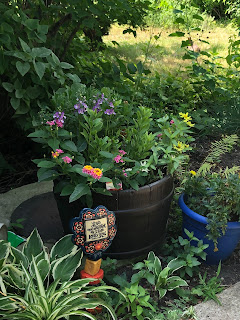There is a black cat who lives in my neighborhood. I don't think it's a stray or someone's outdoor cat. I think it may be feral. It's not sleek and shiny. Its hair stands on end. It looks healthy enough but is definitely not overfed.
I see it sometimes early in the morning settled into one of the cushioned patio chairs when I come outside to drink my coffee. It looks at me steadily, calmly, for a few moments before slowly abandoning the comfortable spot. It doesn't startle and run off. It just cedes the territory, eyebrow arched, letting me know it will be back. While I don't see the cat often, some mornings I do see a bit of fur left behind in the chair. I assume it's there more often than I see it, early in the morning or during the night.
One morning, recently, as I sat outside with my coffee and my notebook, I heard a sudden rustle behind me. I turned quickly enough to see the black cat dive into the weeds along the fence, through a hidden corridor under the greenery. It swooshed down the twenty-foot patio and suddenly reappeared at the other end with a little leg hanging down out of its mouth.
My jaw dropped. I held very still. The cat stood still for a moment as well, looking for a way out of the yard. The prey in its mouth posed a brief spatial puzzle. Which way to fit through? Under the gate? Around? And then it was gone. I could not see in what direction it went to tear up its prey and eat its breakfast.
What did the cat catch? A very tiny baby bunny, perhaps, that had wandered from the nest? More likely a rat. Though I've never seen one around the exterior (or interior) of my house, the local paper tells me they're probably there in the alley. Whatever it was, I think it was too big to be a mere mouse.
This little bit of excitement made me think some more about something that had happened the previous week in my backyard. I had come down the back stairs in the morning and found a dead mouse at the bottom. It seemed an unlikely place for a mouse to expire, but there it was, laid on its side, attracting flies.
I'm no stranger to dead mice. There are always boxes of Deacon mouse bait in the dark corners of my attic. The little critters occasionally die right out in the open, instead of just passing away in the walls and stinking for a day or two. I don't like having to pick them up and take them to the garbage. Back in the days when a husband and sons lived in this house, I was not ashamed to be squeamish and rely on them to pick up dead mice. But now that's my job. I got a trowel from the garage and a plastic grocery bag from the house and used the one to flick the mouse remains into the other. I walked quickly to the garbage can, dropped it in, and was glad to be done.
But now I wonder. I've heard stories from cat owners of their indoor pets leaving them trophies at the bottom of the stairs in the early morning hours — the mice they've killed in service of their masters. Did that black cat leave that mouse for me, in tribute to my ownership of the backyard? Or maybe, as an acknowledgement of our shared reign? Is this cat truly feral, or is it remembering some old relationship with a human who cared about it?
Just a few days ago I again saw the cat, this time in my herb garden. It snuck around the oregano and crouched expectantly on top of the chives. I couldn't quite see it, but I heard the pounce into the sage. Did it catch anything? I don't know.



